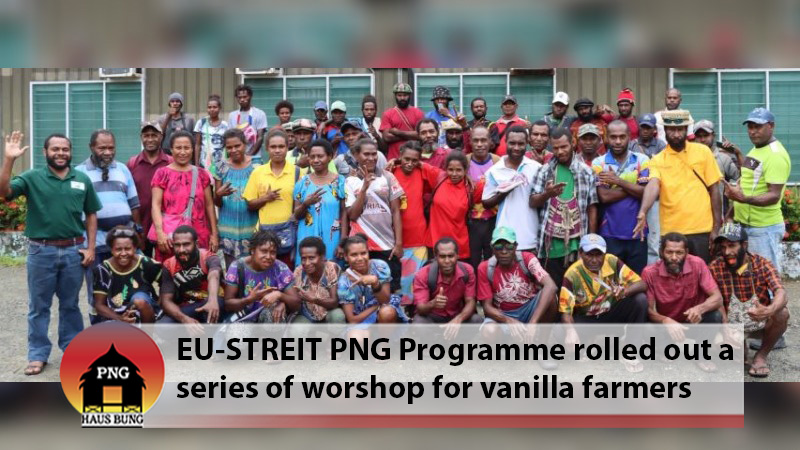In collaboration with the New Guinea Binatang Research Centre, the Food and Agriculture Organization of the United Nations (FAO) under the EU-STREIT PNG Programme rolled out a series of intensive capacity development workshops targeting vanilla farmers in the Sepik Region of Papua New Guinea to tackle increasing climate-change impacts on agriculture and food security.
These trainings were held in 11 locations across nine districts of East and West Sepik provinces, including Wewak, Angoram, Yangoru-Saussia, Ambunti-Dreikikir, Maprik, Wosera-Gawi, Vanimo-Green, Aitape-Lumi, and Nuku. Under the theme, “Farmers’ Training on Climate Smart Agriculture in Vanilla Production”, the workshops brought together 1233 participants, with almost 20 percent of women and 30 percent of youth participation.
To further strengthen the built capacity among the farmers as well as to ensure the sustainability of knowledge and skills at the farmers’ level, the participants were trained as Trainers-of-Trainers (ToTs) and empowered to transfer the taught skills and techniques on best agriculture practices to fellow farmers in their respective communities.
The workshops’ content covers all aspects of Climate-Smart Agriculture practices, from land preparation to marketing and how to use vanilla’s generated income to sustain their livelihood.
“After attending the training, the farmers understand and learn what to do in the field and why these practices like pollination techniques, block management are important to continue or improve on to produce quality vanilla beans for more income and to sustain their lives and livelihoods,” explained Lisa Paschalis one of three experts from Binatang Research Centre who facilitated the trainings.
For the participants, the training was an eye-opener to climate change and the risks it poses on agriculture production and their crops like vanilla. “I am learning new things in this training like making sure that my vanilla block is always clean to avoid pests and diseases,” said female farmer and mother Josephine Aikaiwa of Nienguanje Village in Wewak Rural LLG who attended the two-day session held in Wewak.
“This is an excellent partnership between the EU-STREIT PNG and the New Guinea Binatang Research Centre to undertake this awareness through trainings like this because initially, we had no idea what was happening to our vanilla crops. We now learned that because of climate change, different kinds of pests and diseases can destroy or damage our vanilla. With this training, we learnt how to manage our blocks properly,” said Alphonse Kare, a farmer and Ward Member of Dagua LLG. “This training is very helpful to us, and I urge all participating farmers to share best practices with others in their households and communities,” added Joel Soromari, a farmer and Ward Member of Wrindogung Village in Wewak Rural LLG.
These workshops on sustainable agriculture and climate-smart practice provide further capacity development opportunities for hundreds of lead farmers who had been already equipped with agricultural production and processing tools and materials and skill training sessions on vanilla cultivation, husbandry and processing by the EU-STREIT PNG Programme.
“Partnership with PNG national authorities and scientific institution to support improving agricultural extension services and ensuring the sustainability of agri-food value chain development interventions, is a top priority for the EU-STREIT PNG Programme,” said Dr Rabi Rasaily, the FAO Senior Agriculture Officer and the Programme Coordinator a.i., adding “with triggering cascade effect, these built capacities at the coach farmer level, help transforming practices adopted by thousands of farmers and increase rural communities’ resilience to climate-change impacts.”
The EU-STREIT PNG Programme, being implemented as a UN Joint Programme (FAO as the leading agency, and ILO, ITU, UNCDF and UNDP as partners), is the largest grant-funded Programme of the European Union in the country and the Pacific region.
The Programme aims to help improve the lives of the people from East Sepik and West Sepik provinces, by focusing on increasing sustainable and inclusive economic development of rural areas through improved economic returns and opportunities from cocoa, vanilla and fishery value chains while strengthening and improving the efficiency of value chain enablers, including the business environment and supporting sustainable, climate-proof transport and energy infrastructure development.

